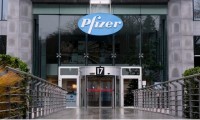-
Novo Nordisk Strikes Deal for Late-Stage Hypertension & Kidney Disease Drug
- Source: drugdu
- 219
- October 18, 2023
-
FDA Forms New Digital Health Advisory Committee to Cover Growing Role of Tech
- Source: drugdu
- 200
- October 17, 2023
-
Interest in RNA Editing Accelerates as Therapies Approach the Clinic
- Source: drugdu
- 134
- October 17, 2023
-
FDA Approves Pfizer’s Ulcerative Colitis Drug, $6.7B Arena Buy Pays Off
- Source: drugdu
- 104
- October 17, 2023
-
Mount Sinai researchers receive NIH grant to compare new treatment options for sickle cell disease
- Source: drugdu
- 159
- October 14, 2023
-
Elligo Health Research expands Study Marketplace with Syneos Health
- Source: drugdu
- 150
- October 13, 2023
-
Bayer christens $250M cell therapy ‘launch facility’ in Berkeley
- Source: drugdu
- 140
- October 12, 2023
-
ABVC BioPharma obtains patent for MDD treatment in Taiwan
- Source: drugdu
- 157
- October 11, 2023
-
FDA Blocks Alnylam’s Bid to Expand Onpattro Label
- Source: drugdu
- 107
- October 11, 2023
-
Compound found to inhibit influenza virus replication by targeting host enzyme
- Source: drugdu
- 93
- October 11, 2023
your submission has already been received.
OK
Subscribe
Please enter a valid Email address!
Submit
The most relevant industry news & insight will be sent to you every two weeks.













